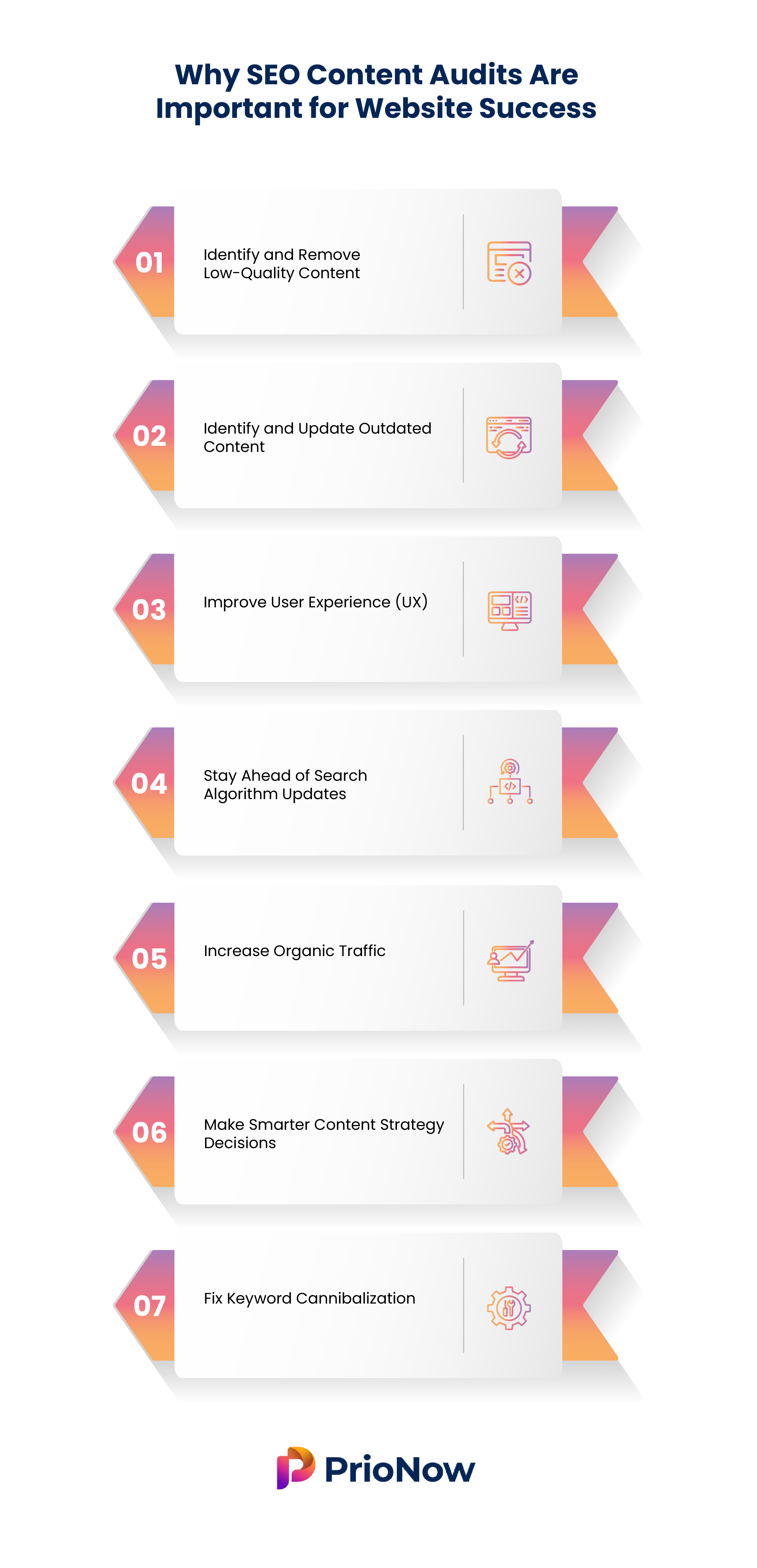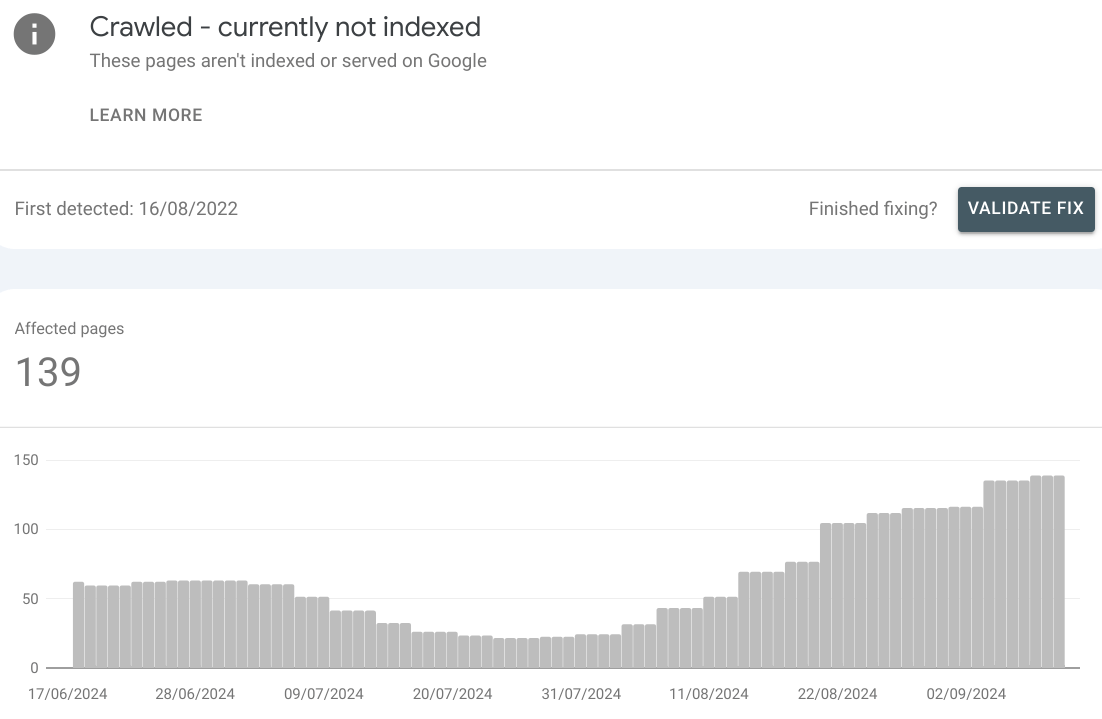SEO content audits are useful because they help evaluate your content’s quality, detect SEO issues, uncover new opportunities, and ensure everything is optimized for both users and search engines.
Let’s explore some of the key ways content audits can benefit your site:

1. Identify and Remove Low-Quality Content
Google’s approach has changed, with a much stricter focus on content quality. After the September 2023 Helpful Content Update and the October 2023 Core Update, Google now evaluates the overall quality of a site before indexing its pages.
At SERP Conf 2024, Gary Illyes, an analyst at Google, explained that a high number of “Crawled – Currently Not Indexed” pages in Google Search Console can signal broader quality issues. Google may skip indexing if it finds similar or better content elsewhere.
At PrioNow, we’ve observed that Google may even deindex some pages if they’re considered unhelpful. We’ve seen this firsthand with one of our sites, as shown in the screenshot below. We’ve also noticed a clear link between pages flagged as “Crawled – Currently Not Indexed” and pages with little to no traffic.

Pro Tip: By eliminating low-quality content, you help Google focus on your high-value pages, improving your domain’s overall quality signal. You can also choose to improve and re-index pages if you believe they can still provide value to your audience.
2. Identify and Update Outdated Content
Outdated content can similarly affect your SEO performance. As algorithms and user expectations change, content that once ranked well can become irrelevant. As mentioned earlier, Google now prioritizes new, valuable content, especially in response to AI-generated information. If your content doesn’t offer something fresh or better than what’s already on the web, it risks being ignored by Google or deindexed altogether.
Through a website content audit, you can identify outdated pages and decide whether to update or remove them if they no longer align with your strategy. Updating old content can bring significant SEO gains.
Pro Tip: To meet Google’s higher bar for quality, ensure your updates add new insights, data, or depth to the topic. Simply rewording existing content won’t be enough to meet today’s standards.
3. Improve User Experience (UX)
The quality of your content plays a direct role in how users experience your website. Difficult navigation, excessive ads, or outdated information can frustrate visitors and cause them to leave quickly.
A content audit helps you identify and fix these issues. You can add internal links, remove intrusive ads, and simplify overly complex text to make your content more user-friendly. These improvements keep visitors engaged, which also boosts your performance, as search engines take user behavior into account when ranking pages.
Pro Tip: Regularly monitor your website’s performance metrics like bounce rate and time on page. Use your content audit findings to focus on improving these areas, ensuring both users and search engines have a better experience with your site.
4. Stay Ahead of Search Algorithm Updates
Search engines like Google frequently update their algorithms, which can change how your content ranks. What worked a few years ago may no longer be relevant today. Regular content audits ensure that your content aligns with the latest SEO standards and best practices, like focusing on helpful content.
Pro Tip: If you notice a sudden drop in rankings, use your content audit to identify any issues. Updating and improving that content can help you regain lost rankings.
5. Increase Organic Traffic
One of the biggest benefits of content audits is the potential to increase your organic traffic. By optimizing existing pages and filling content gaps, you make your site more relevant to search queries. During an audit, you might discover keywords your competitors are ranking for or topics your audience is searching for that aren’t fully covered on your site. You can create new content or update existing pages to address these opportunities.
Pro Tip: Look for keyword gaps and search terms where you’re ranking but not fully optimized. By refining and optimizing your content around these terms, you can effectively boost organic traffic and capture additional search opportunities.
6. Make Smarter Content Strategy Decisions
Audits provide valuable insights into what content is working and what isn’t. You can track which pages drive the most traffic and engagement, helping you create a more focused content strategy. Instead of guessing, you can make data-driven decisions about which content to produce or improve.
Pro Tip: Use audit insights to guide your strategy. Focus on the pages that drive the most traffic and engagement, and prioritize improving or expanding on those topics. This data-driven approach ensures you’re investing in content that delivers the best results.
7. Fix Keyword Cannibalization
Keyword cannibalization occurs when multiple pages compete for the same keyword, reducing their ranking potential. Instead of one strong page ranking well, you end up with several weaker pages, which confuses search engines.
A content audit can help you identify keyword cannibalization. For one of our sites, we found that multiple pages were targeting the same keywords, causing all of them to rank poorly. After consolidating the content into a single, more authoritative page, we saw a significant improvement in rankings.
Pro Tip: Once you identify these issues, you can either consolidate the content into one stronger page or adjust the keywords each page targets to avoid overlap.
Conclusion
Regular SEO content audits are key to keeping your website updated and well-optimized. Tools like PrioNow can automate this process, making it easier for you to stay on top of your SEO performance without spending hours on manual reviews.
